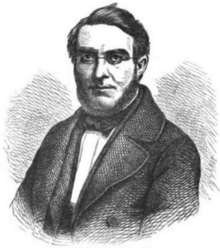Theodor Waitz
Theodor Waitz | |
|---|---|
 | |
| Born | 17 March 1821 Gotha, Thuringia |
| Died | 21 May 1864 (aged 43) Marburg, Hesse |
| Education | |
| Occupation(s) | Psychologist, anthropologist |
Theodor Waitz (17 March 1821 – 21 May 1864) was a German psychologist and anthropologist. His research in psychology brought him into touch with anthropology, and he is best known for his monumental work in six volumes, Die Anthropologie der Naturvölker ("The anthropology of peoples that live close to nature").[1]
Biography
[edit]Waitz was born at Gotha and educated at the universities of Leipzig and Jena. He made philosophy, philology and mathematics his chief studies, and in 1848 he was appointed associate professor of philosophy at the University of Marburg (full professor, 1862).[2] He was a severe critic of the philosophy of Fichte, Schelling and Hegel, and considered psychology to be the basis of all philosophy. He died in Marburg.[1]
Theorizing boredom
[edit]Theodor Waitz contributed significantly as an affective psychologist, particularly in the field of conceptualizing boredom.[3][4] According to Waitz, boredom was about flow of thoughts. As one thought begets another, expectations on where this thought is moving towards are generated.[5] Boredom arises when those expectations are not met. Boredom is basically associated with a break in the expected flow of thoughts because of a mismatch between expected and actual mental activity.[3]
Works
[edit]The first four volumes of his Anthropologie der Naturvölker appeared at Leipzig, 1859–64, the last two were issued posthumously, edited by Georg Gerland. Waitz also published:
- Grundlegung der Psychologie (1846).
- Lehrbuch der Psychologie als Naturwissenschaft (1849).
- Allgemeine Pedagogik (1852).
- Die Indianer Nordamerikas (1864).
- Aristotelis Organon graece; a critical edition of the Organon of Aristotle (1844).[1]
References
[edit]- ^ a b c Chisholm 1911.
- ^ Waitz, Franz Theodor Hessian Biography
- ^ a b Velasco, Josefa Ros (23 September 2019). Boredom Is in Your Mind: A Shared Psychological-Philosophical Approach. London: Springer Nature. p. 58. ISBN 978-3-030-26395-9. Retrieved 23 February 2022.
- ^ Romand, David (2015). "Theodor Waitz's theory of feelings and the rise of affective sciences in the mid-19th century". History of Psychology. 18 (4): 385–400. doi:10.1037/a0039797. PMID 26551862. Retrieved 23 February 2022.
- ^ Danckert, James (9 June 2020). Out of My Skull: The Psychology of Boredom. Cambridge: Harvard University Press. p. 8. ISBN 978-0-674-98467-7. Retrieved 23 February 2022.
- Ripley, George; Dana, Charles A., eds. (1879). . The American Cyclopædia.
- Burton, R.F. (1864), "Notes on Waitz's Anthropology", Anthropological Review, Vol. II, pp. 233–50.
Attribution:
- This article incorporates text from a publication now in the public domain: Chisholm, Hugh, ed. (1911). "Waitz, Theodor". Encyclopædia Britannica. Vol. 28 (11th ed.). Cambridge University Press. p. 247.


 French
French Deutsch
Deutsch